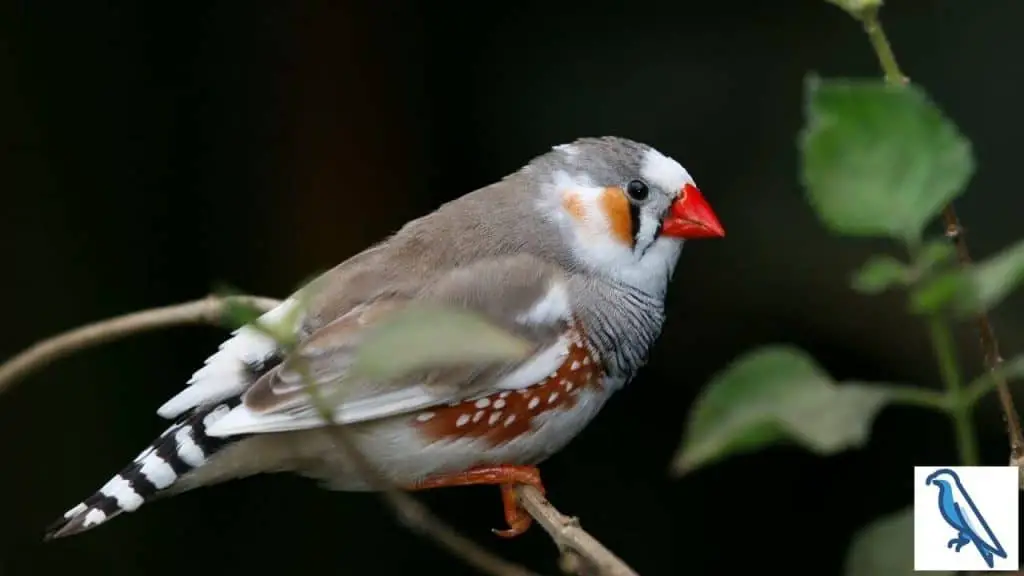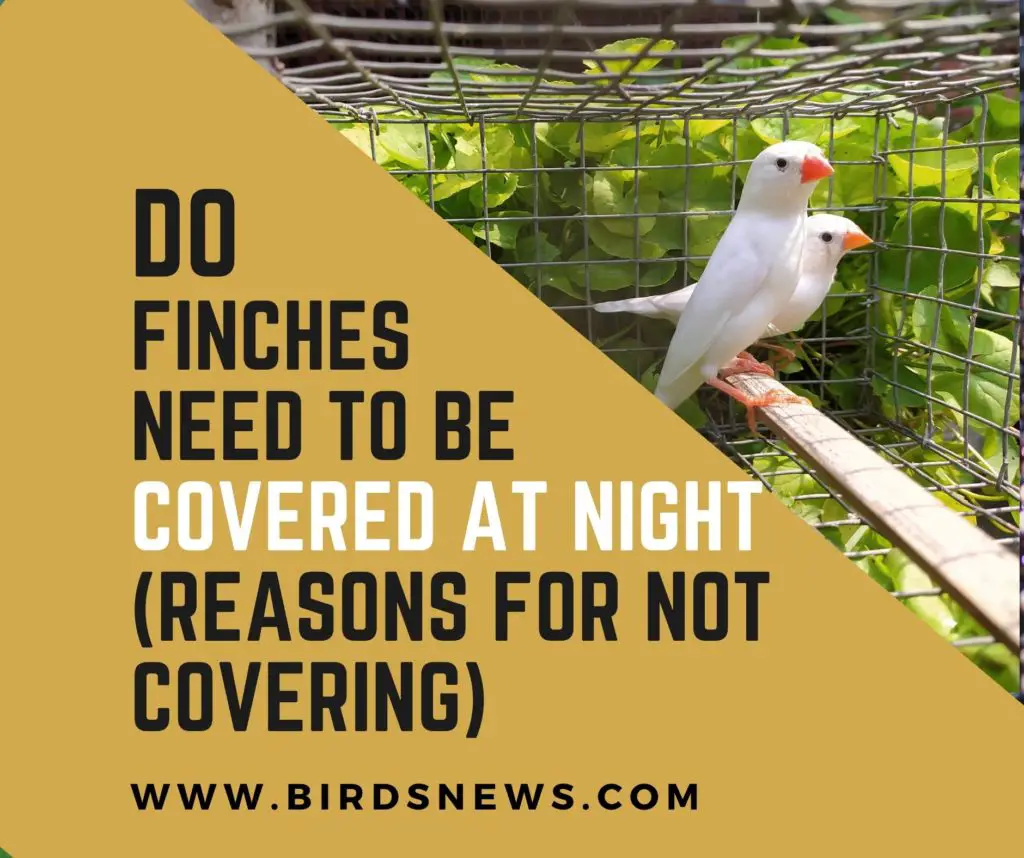Finches, whether in the wild or captivity, need a particular surrounding for joyful living. As a pet owner, you are responsible for taking proper care and providing the necessary ambiance, which would help your finches remain happy and chirpy. Besides good nutrition, you must also look into the other factors such as their living conditions, which keep them joyful when awake and provide proper cover or a dark room to rest at night.
Like any other bird species, Finches need a proper habitat that would help them grow and live longer.
They need a friendly environment that provides suitable temperature, adequate light, fresh air, and a pleasant view of watching and hearing other birds in the open.
As you know, in the wild, finches sleep at night without any cover. So, in captivity, do finches need to be covered at night?
No, covering the entire cage may suffocate finches in absence of fresh air. Even at night, finches should get ideal living conditions.
You may place their cage on the floor, a cage stand, or even hang it, but ensure the place you choose is draft-free, with no direct exposure to heat or cold air.
Let us now understand whether it is fine to cover your finches at night and in which scenarios you can leave your finches uncovered.

Why Should I Cover My Finches At Night?
Like most of the birds in the wild, pet finches also follow the same sleep pattern. Finches sleep at sunset and wake up at sunrise. You must create a proper habitat that helps them in staying active and healthy.
Covering the entire finch cage at night may create problems, which we have already discussed earlier. However, along with good food, finches also need to get adequate sleep to remain in peak condition.
Keeping them exposed to light or in a place where there is a loud noise at night would create stress, deprive them of proper sleep, and deteriorate their health in the long run.
If you are interested in buying good quality and comfortable cage for your finch, check out these products on Amazon.
To ensure that your finches get adequate sleep at night, you can cover your finch cage in such a way that there is enough ventilation. Keeping the cage covered at night mimics that nest cavity, as it cuts off the unnecessary light from entering the finch cage.
It also provides shelter from the draft caused by your heater, air-conditioner, or air purifier.
Alright! Now that you know the reasons for covering your pet bird, let us also understand if your finches get quiet and feel secure when covered.
Why Do Finches Get Quiet When Covered?
Here we need to understand the body clock, which maintains the schedule and regulates the timing of processes like eating, sleeping, and maintaining the required body temperature in every living being on this planet.
In the wild, the finches body clock, like all other species, works wholly and naturally depending on the day and night cycle. However, in captivity, things don’t always work naturally. You will have to create an environment for your finches that mimics precisely like being in the wild.
If your finch cage is exposed to continuous light and disturbances even at night, it would create an impression of daytime and keep your finches awake for long hours.
Overindulgence in any activity can lead to undue stress and exhaustion for your finches, causing adverse effects on their health. To avoid such a situation, you can cover your finch cage with a dark cloth or blanket. The cloth on the finch cage would block out the light and put your finches back to sleep.
If you have a quiet room in your house, you may even move the finch cage in that room at night. It would provide a perfect space for your finches to get sound sleep at night. So, in the presence of a dark and silent room in your house, do you think it is possible to leave your finches uncovered?
When Can You Leave Your Finches Uncovered?
The main purpose of covering the finch cage is to provide a surrounding that mimics like nest cavity, offering shelter and making them feel safe. Living in a secure environment makes them playful during the day and helps get adequate sleep during the night, which is vital for your birds well-being.
You need to assess certain things before deciding whether to keep your finch cage uncovered at night.
- Light – Finches generally prefer dark sleeping time. The room where you plan to keep your finch cage at night should relate to them like being in the wild, with minimal to no light at night.
- Sound – You have to ensure the room where you intend to keep the finch cage is silent at night. Continuous sounds will disturb their sleep and keep your finches awake.
- Draft in the room – Draft refers to the flow of air current in the room. The place must have an adequate supply of fresh air. However, the flow must not be directly on the finch cage kept in the room. You have to find a draft-free place in the room to keep your finch cage.
By creating a congenial place for your finches, you may keep your finch cage uncovered as you have ensured, there is nothing that disturbs their sleep at night.
Related Further Reading:
- Do Zebra Finches Smell Bad? + Are Zebra Finches Messy Birds?
- Do Finches Like Music? + Are Finches Happy When They Sing?
- Do Finches Have Ears? (Do Finches Have Good Hearing)
- Do Finches Recognize Their Owners? (Do Finches Feel Attached To Their Owners)
Are Finches Scared Of The Dark?
As a pet owner, you are responsible for taking care of all the requirements of your finches. It is of utmost necessity to recognize what scares your pet finches and take adequate measures to ensure they feel safe.
Like other birds, Finches relate to darkness as sleeping time and therefore are comfortable in the dark. Younger chicks may feel uneasy initially when they are kept in the darkroom but adjust over a period of time.
Though finches are not scared of darkness, few reasons may scare your pet finch. You should be aware of those things and take steps to make them feel comfortable.
- Loud Noise – High volume of your television set, deafening sound from sirens of an emergency vehicle, and noise from slamming of doors can unsettle your finches and make them nervous. You definitely cannot control everything but can be mindful of a few and try to avoid them.
- Strange or New people – Finches may take some time to develop bonding with their owners. If they encounter new people, they feel anxious about the new visitor and may shy away from him.
- Other pets in the house – As a pet lover having a cat or dog which roams freely around the home can leave your finches petrified. Cats and dogs are often intrusive, and your pet finches may feel insecure as they have not developed an affinity towards the other pets.
- Wild Birds – Your pet finches may feel frightened by the mere sight of birds of prey, or even its shadow can be disturbing. They are also bothered by crows who often linger around the windows of your house.
Usually, finches are diurnal, meaning they follow the same sleep pattern as we humans do. They sleep at night and awake when the sun rises. So, at night, if the lights are on, can your finches sleep peacefully?
Can Finches Sleep With Lights On?
Finches like to rest when you provide them suitable conditions that are conducive to sleep. Keeping lights on would keep your finches awake as their instincts are to stay awake while there is light around them.
If you keep the lights on through the night, your finches may try to stay awake as it creates an impression of the daytime. You must make sure that the lights are off at night, as finches associate darkness with sleep.
Related Further Reading:
- Are Finches Affectionate? + Do They Like To Be Handled By Humans?
- Do Finches Feed Their Babies? (How Long Can Babies Live Without Food?)
- Do Finches Attack Humans? + How To Handle A Finch’s Aggression?
- Do Finches Have Good Eyesight? (Do Finches Have Good Vision At Night?)
- Do Finches Kill Their Babies? (Why Do Baby Finches Die)
Conclusion
Finches, whether in the wild or captivity, need a particular surrounding for joyful living. As a pet owner, you are responsible for taking proper care and providing the necessary ambiance, which would help your finches remain happy and chirpy. Besides good nutrition, you must also look into the other factors such as their living conditions, which keep them joyful when awake and provide proper cover or a dark room to rest at night.

Hi, There and Welcome to BirdsNews.com, is here to help you learn and care about pet birds. and this blog is a journal of everything I’ve learned.







